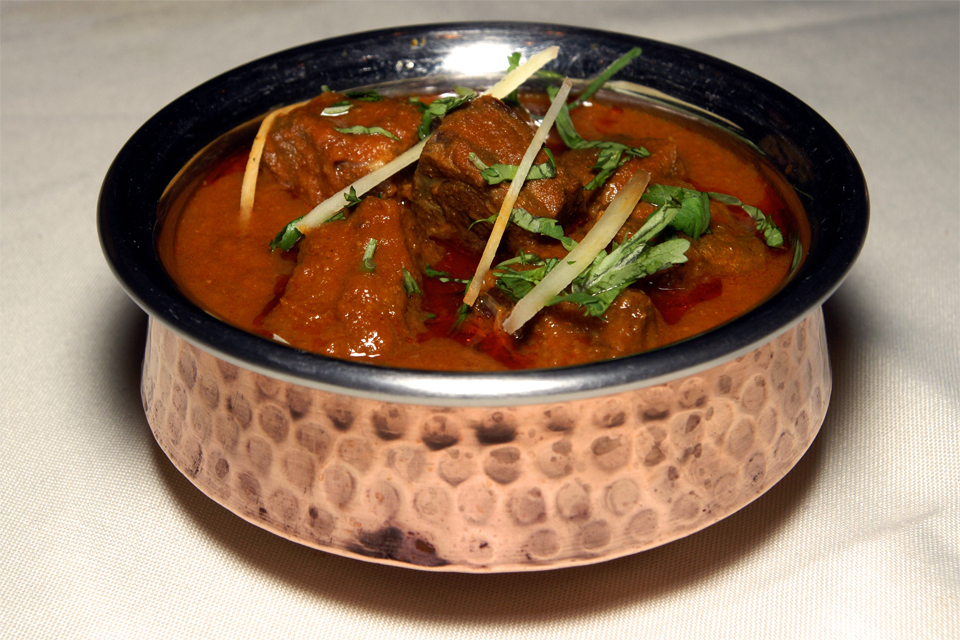
Beef Vindaloo with Basmati Rice

Indian curries are very energy dense and delicious dishes, however they usually contain great amounts of fat, especially saturated one. Being interested in sports nutrition as well as a person that particularly enjoys Indian food I decided to challenge myself by attempting to create a healthy, yet energy and nutrient dense option for an athlete that needs a high kJ meal providing all the necessary nutrients that promote post-exercise recovery and glycogen replenishment.
Method
Beef Vindaloo
- 1. Heat the oil in a large heavy-based saucepan over high heat. Add the steak and cook, turning occasionally, for 2-3 minutes or until browned all over.
- 2. Fry onion, garlic and chilli in water in non-stick pan and cook, stirring often, for 2 minutes or until it softens slightly.
- 3. Add paste and cook, stirring, for 1 minute or until aromatic.
- 4. Return steak to the pan and toss to coat. Add stock, increase heat to high and bring to the boil.
- 5. Reduce heat to low and simmer, covered, stirring occasionally, for 1 hour 10 minutes.
- 6. Uncover and simmer, stirring occasionally, for 20 minutes or until beef is tender and the sauce thickens slightly.
Basmati Rice
While preparing the beef madras, boil the basmati rice using a rice:water ratio of 1:2 e.g. 400g basmati in 800mL of water.
When the water starts boiling lower the heat, simmer for 12 - 15 minutes before turning off the heat. Then remove rice from heat and stand covered, for another 5-10 minutes, until you're ready to serve. The rice should have absorbed all the water and will just need fluffing up with a spoon.
Combine the yoghurt and coriander in a small bowl. Spoon the rice into serving bowls and top with the beef vindaloo. Accompany with the coriander yoghurt.
Nutrition Analysis
This is an energy dense meal, with kJ primarily coming from complex carbohydrates, ideal for an athlete looking to replenish his glycogen stores post exercise. 126.5g of carbohydrates would be ideal for an 80kg athlete needing approximately 1.5g of carbohydrates per kg of body weight 30min post exercise for optimal glycogen replenishment (according to the American Dietetic Association, the Dietitians Association of Australia and the Australian Institute of Sports). Also 53.7g of protein will be ideal to promote recovery following exercise. Protein mainly comes from high biological value sources such as lean red meat and dairy. The saturated to unsaturated fat ratio is 33% : 67% which can be considered close to optimal (saturated fat being 1/3 of total fat). This meal also provides various micronutrients important for athletes, such as haem iron (64%) and vitamin B12 (for haemopoiesis) as well as zinc (for testosterone production and boosting the immune system); the rice provides thiamin (important in carbohydrate metabolism); the yoghurt, vitamin D and calcium (essential for bone health and cell signaling); and finally the oil, the vindaloo paste and the vegetables (onion, garlic, chilli) provide antioxidants such as vitamin E, vitamin C, squalene, lycopene, quercetin, alliin, glutamylcysteines, cysteine sulphoxides and many others that contribute to several functions including the free radical scavenging that is important during and post-exercise. The sodium content may be of concern for those with high blood pressure or heart diseases. Yet, for the normotensive athlete it may be beneficial as combined with the appropriate fluid volume it may result in an optimal tonicity, promoting an ideal osmotic environment for post exercise rehydration and body fluids replenishment.